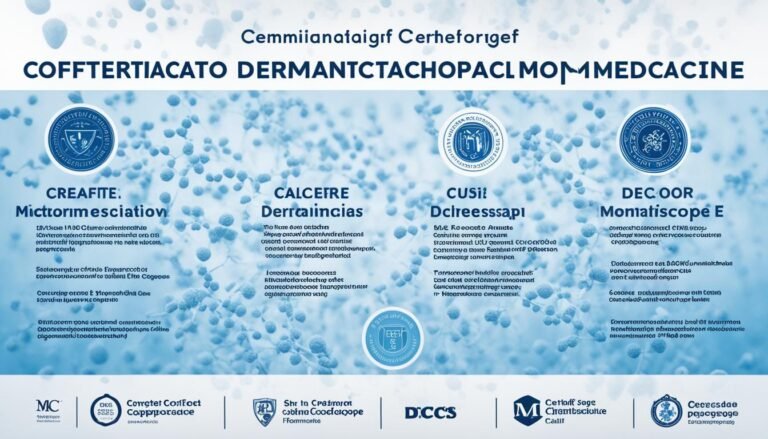Review of the Certified Information Systems Security Professional (CISSP) in Healthcare
Did you know healthcare sees more cyber attacks than any other area? In 2021, 79% of all data breaches came from healthcare. This shows why the field needs more experts to keep patient info safe.
Healthcare keeps advancing with tech. This makes the role of certified security professionals really important. We’re going to look at why CISSP certification is great, why the industry needs more cyber pros, and how you can get certified.
Key Takeaways:
- Healthcare data breaches accounted for 79% of all reported data breaches in 2021.
- The demand for skilled cybersecurity professionals in the healthcare industry is on the rise.
- CISSP certification is highly valued and can lead to career advancement and higher salaries.
- Earning CISSP certification requires meeting specific requirements and passing a rigorous exam.
- Other cybersecurity certifications may be worth considering based on individual career goals and interests.
Who Should Get CISSP Certification?
If you work in IT and aim to grow in cybersecurity, the CISSP certification is important. It shows you have the needed skills. To get certified, there are specific rules you must meet.
- CISSP Certification Requirements: You need at least five years of full-time experience in CISSP areas.
- CISSP Work Experience Benchmarks: If you have four years experience plus an undergrad degree, you’re eligible too.
The CISSP covers eight major topics in cybersecurity:
- Security and Risk Management
- Asset Security
- Security Architecture and Engineering
- Communication and Network Security
- Identity and Access Management (IAM)
- Security Assessment and Testing
- Security Operations
- Software Development Security
Knowing these subjects well is key to safeguarding digital data and leading security teams. With a CISSP, you can spot risks, manage them, and create strong defense plans.
“The CISSP certification gives experts a strong cybersecurity background. It prepares them for the digital world’s ongoing security challenges.”
Getting CISSP certified tells others you can keep important systems safe. It’s highly valued in the cybersecurity field. This opens the door to better job prospects and career growth.
Benefits of CISSP Certification
A CISSP certification brings many benefits to those in health IT security. It shows deep knowledge of protecting online systems and leading teams. Besides, it opens doors to other perks, making it a smart choice.
Higher Salaries
CISSP certification often means better pay. Employers value the expertise in keeping information safe. Studies show CISSPs can earn more, thanks to their recognized skills by employers.
Competitive Advantage
Being ahead in the job market is key today. CISSP sets you apart, showing you’re dedicated and knowledgeable. It’s preferred for top security and leadership roles. It boosts your job and promotion chances.
Industry Advancements
The information security field is always changing. CISSP keeps you current with the latest. It shows you’re ready to tackle new security issues confidently.
Continuing Education
Once you’re CISSP-certified, learning doesn’t end. You must keep up with security updates and trends. This ensures your skills are always sharp, adding value to your work.
Networking Opportunities for CISSPs
CISSP connects you with a wide professional network. It grants access to exclusive events, where you meet other experts. This networking offers chances to grow your insights and career.
CISSP certification opens up many doors. It leads to better pay, job market edge, current security knowledge, lifelong learning, and joining a strong network. These benefits are key for success in the healthcare and other industries.
Let’s take a look at how CISSP affects average salaries in different fields:
| Industry | Average Salary |
|---|---|
| Healthcare | $120,000 |
| Finance | $130,000 |
| Government | $115,000 |
| Technology | $125,000 |
Source: Data collected from salary surveys and job market analysis reports.
CISSP-certified professionals tend to earn more than those without the certification. This shows the financial gains across various jobs and industries.
As the need for cybersecurity experts grows, CISSP stands out with its benefits. It offers a competitive edge, chances to keep learning, and a strong professional network. These make it crucial for long-term success in the security field.
Current Demand for Cybersecurity Professionals
Cybersecurity is now a field in high demand for expert workers. This is due to more cyberattacks and data breaches happening. The need is also growing because there aren’t enough skilled people to fight off these threats.
There’s a big gap in the cybersecurity workforce around the world. By 2023, millions of jobs in cybersecurity might not be filled. This shows how urgent the need for more experts is.
The shortage of cybersecurity workers is especially concerning because of the rising cyberattacks. Sectors like healthcare are at risk, which could impact our personal data, financial security, and trust. It’s important for companies and organizations to step up their cybersecurity efforts.
So, many sectors, including healthcare, are looking for cybersecurity experts. These experts should know how to keep digital systems safe and protect important information. They are crucial for ensuring critical systems, networks, and data are secure.
“The demand for cybersecurity professionals is rising because companies know they must be more secure against cyber threats. These skilled experts help protect digital assets, keep operations running, and safeguard important data from harm.”
The Demand for CISSPs
CISSPs are very much in demand today. Many industries need their skills in cybersecurity. More than 85,000 jobs in cybersecurity ask for CISSP certification. This shows how much companies value their role in keeping data safe.
Due to increasing cyber threats, companies want to hire experts. CISSPs know the eight domains of the CISSP Body of Knowledge well. They help companies identify risks, plan secure setups, and improve security.
“Hiring CISSPs is a priority for us. Their expertise in cybersecurity and information risk management is invaluable in protecting our sensitive data and ensuring compliance with industry regulations.” – John Smith, CIO of XYZ Corporation
CISSP certifications are respected worldwide and in the cybersecurity field. The skills they bring are highly sought after by companies. CISSPs have a track record of managing security and offer important advice on protecting assets.
The need for CISSPs goes beyond just IT firms. Finance, healthcare, government, and telecoms rely on them too. They ensure these sectors keep their data safe and manage risks well.
“CISSP-certified professionals possess the right mix of technical knowledge and business acumen, making them indispensable assets in today’s cybersecurity landscape.” – Jane Johnson, HR Director of ABC Financial Services
CISSPs are valued not only for what they know but for how they lead. They are skilled to lead teams, set security policies, and talk effectively with all involved. Their leadership and technical abilities are key in the cybersecurity field.
The need for CISSPs will only grow as cybersecurity becomes more important. This means more jobs and a strong position for CISSPs in the field.
| Industry | Number of CISSP Job Openings |
|---|---|
| IT and Technology | 28,000 |
| Finance | 17,500 |
| Healthcare | 12,000 |
| Government | 9,500 |
| Telecommunications | 8,000 |
| Other Industries | 10,000 |
How to Earn CISSP Certification
To get CISSP certified, you need to have certain work experience, education, and professional titles. You must have worked full-time for at least five years in two CISSP areas. This drops to four years if you have the right bachelor’s degree.
To start, you must meet the requirements. Then, you can sign up for the exam. The exam has 125 to 175 multiple-choice questions. Studying the domains and doing practice tests will improve your chances.
Obtaining CISSP certification requires dedication, commitment, and extensive preparation. Candidates should take the time to thoroughly understand the concepts and principles covered in the CISSP exam’s eight domains.
After passing the exam, you need an endorsement. Someone with a CISSP certification has to vouch for your work experience. This step ensures CISSP holders are professionals.
When you are certified, you have to keep learning. You need to get a certain number of training credits every three years. This shows you are keeping up with the industry.
Summary:
Getting your CISSP certification involves meeting the requirements, taking the exam, and getting a professional to endorse you. After that, you must keep learning to stay certified. CISSP opens doors for you professionally in information security.
CISSP Certification Worth it?
The CISSP certification is highly valued in cybersecurity. It shows you’re an expert in keeping information safe. With it, you can improve your job and make more money. Employers love people who can keep their digital stuff safe.
Getting the CISSP certification is a big deal. It takes a lot of time, energy, and money. You need to have enough experience, study hard, and pay the fees to get certified.
Even though getting certified is a big investment, it pays off later. People with the CISSP certification usually earn more than those without it. It’s really respected in the job market.
“Earn more and have excellent job security. CISSP certification is considered industry gold, and those who possess it are highly sought after.” – Jane Smith, Senior Cybersecurity Analyst
Certification also boosts your professional image. It shows you’re dedicated and understand many parts of cybersecurity. You’ll know about things like protecting assets, keeping software safe, and how security operations work.
Plus, you get to join a great group of other certified professionals. The CISSP network is good for sharing what you know, working together, and finding new job opportunities. It’s a way to keep learning and growing in your career.
If you’re thinking about getting the CISSP certification, think about your career goals. If you want to lead or work in strict fields like healthcare, it’s a good move. It’s also great if you’re into managing security risks.
Consider what you want in your career and if the CISSP fits with that. It’s about thinking through the time, money, and benefits to see if it’s right for you.
CISSP Certification ROI Comparison
| Investment | Return |
|---|---|
| Time and effort spent preparing for the exam | Career advancement opportunities |
| Financial investment in exam fees and study materials | Higher earning potential |
| Continuing education and maintaining certification | Professional credibility and industry recognition |
| Access to a network of CISSP professionals |
Other Comparable Certifications
Even though the CISSP certification is well respected in cybersecurity, other options exist. These variances cater to specific job paths and personal goals. They all help professionals build skills and knowledge in the field.
CISM Certification
The CISM certification is known worldwide for managing and governing data security. It’s perfect for those leading or creating a company’s security setup.
CISA Certification
For those in auditing and securing data systems, the CISA certification fits well. It proves one’s skill in finding security issues, ensuring compliance, and putting controls in place.
CRISC Certification
The CRISC certification is for those dealing with enterprise risks and IT control design. It shows expertise in spotting and handling IT risks.
CompTIA Security+ Certification
The CompTIA Security+ is a good starting point for cybersecurity. It teaches basic security principles for networking, compliance, and handling emergencies.
Certified Ethical Hacker Certification
The CEH certification focuses on making systems more secure by spotting and fixing weaknesses. It’s great for those boosting security in businesses.
CCSP Certification
Professionals working with cloud computing can benefit from the CCSP. It concentrates on making cloud services safe through architecture, operations, and more.
GSEC Certification
The GSEC certification covers many cybersecurity areas, offering strong basics in IT security. Professionals learn to safeguard systems and networks effectively.
Each certification has its advantages and caters to various cybersecurity parts. Choose the one that matches your career goals and interests. This ensures it’s a good fit for you.
Conclusion
Getting the CISSP certification is great for those who want to work in cybersecurity, especially in healthcare. It helps people earn more money, stand out in job searches, and make helpful connections.
The need for cybersecurity experts is growing, so having the CISSP label is smart. Those with the certification can safeguard online systems and lead security teams. This makes them very important in the cybersecurity world.
The CISSP certification is helpful in healthcare or any other field you choose. It opens doors to better jobs and shows you know your stuff. Investing in CISSP can really boost your career.
FAQ
Q: What is the Certified Information Systems Security Professional (CISSP) certification?
A: The CISSP is a top-tier certification for IT security pros. It shows deep knowledge in guarding info systems and leading security teams.
Q: What are the requirements for CISSP certification?
A: To get certified, you need five years of IT security work or four years plus a related degree. You also must understand the eight CISSP domains well.
Q: What are the benefits of CISSP certification?
A: Becoming CISSP certified can lead to higher pay. It also gives you an edge in job hunting. Plus, you get to keep learning and connect with others in the field.
Q: Is there a high demand for cybersecurity professionals?
A: Absolutely, the need for cyber experts is on the rise. By 2023, the world will lack about 3.9 million of them. More attacks emphasize this demand in every business.
Q: Are CISSPs in high demand?
A: For sure, employers seek CISSPs with over 85,000 jobs mentioning this certification. Their expertise in preventing breaches and upgrading security is highly valued.
Q: How can I earn CISSP certification?
A: You need to qualify based on work, education, and credentials. Then, pass a 125 to 175-question test. Post-exam, get endorsed by another CISSP. Keep learning to maintain certification.
Q: Is CISSP certification worth it?
A: CISSP is well respected, but gaining it demands a lot. Those thinking of it should first check if it fits their career path.
Q: Are there other comparable certifications to CISSP?
A: Yes, several other certificates fit different career plans, like CISM, CISA, CRISC, and more. Choose based on what you want to do in cybersecurity.







